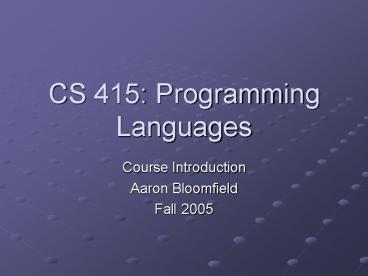CS 415: Programming Languages - PowerPoint PPT Presentation
Title:
CS 415: Programming Languages
Description:
It is assumed that students entering this class have the following background: Experience with an OOP ... Motivational posters... Demotivational posters... – PowerPoint PPT presentation
Number of Views:59
Avg rating:3.0/5.0
Title: CS 415: Programming Languages
1
CS 415 Programming Languages
- Course Introduction
- Aaron Bloomfield
- Fall 2005
2
Prerequisites
- Prerequisites CS216 and CS333 with grades of C-
or above. - It is assumed that students entering this class
have the following background - Experience with an OOP language (such as Java or
C), from CS 101/201 - Experience with a procedural language (such as
C), from CS 216 - Familiarity with an assembly language, from CS
216 or CS 333
3
Course objectives
- Students who complete the course will
- Develop a greater understanding of the issues
involved in programming language design and
implementation - Develop an in-depth understanding of functional,
logic, and object-oriented programming paradigms - Implement several programs in languages other
than the one emphasized in the core curriculum
(Java/C) - Understand design/implementation issues involved
with variable allocation and binding, control
flow, types, subroutines, parameter passing - Develop an understanding of the compilation
process
4
Textbook
- Textbook Scott, Michael. Programming Language
Pragmatics. Morgan Kaufmann 2000 - Textbook errata at http//www.cs.rochester.edu/u/s
cott/pragmatics/errata.html
5
Expected Assignments
- Write programs in several different languages
- Current plan is the five listed a few slides back
- Course project to learn another language of your
choice - Includes a program, paper, and presentation
- Midterm (on Wednesday, 12 October, during class)
- Final exam (on Tuesday, 13 Dec from 900 - 1200)
- Both exams are closed book
6
Grades
- 35 Programming homeworks
- 15 Individual project and presentation
- 20 Midterm
- 25 Final exam
- 5 Class participation
- Class participation will be graded partly based
on attendance - In particular, you need to be conscious during
class! - Just having a pulse and being present is not
sufficient
7
Late policy
- Each person will be allowed ONE late day (24
hours) this term - The late policy is 30 off for first 24 hours
late, 50 off for the next 24 hours - Assignments are not accepted after 48 hours from
original due date - Note that using your late day extends this
calendar by 24 hours, so that you could turn the
assignment in up to 72 hours after the original
due date
8
Theory vs. Implementation
- This class focuses on both
- Theory is covered by the textbook readings,
lectures, and on the tests - Implementation is covered by the homework
assignments and the project - You will need to do both to do well in the course
- You cant slack off on the theory part!
- Thus, if you dont keep up with the readings, you
will end up with a poor grade in the course
9
Tentative schedule
- See the website
10
Class Topics
- History
- Major paradigms
- Historical (Fortran)
- Functional (Scheme or OCaml)
- Logic (Prolog)
- Object-oriented (Smalltalk)
- Aspect-oriented (AspectJ)
- How different languages deal with
- Naming and scopes
- Control flow
- Types
- Subroutines
- Language design and implementation tradeoffs
- Compilers, debuggers, programming environments
11
Programming languages vs. compilers
- This is not a compilers course
- But we will be studying compilers in great detail
- The two fields are very closely linked
- You cannot understand one without understanding
the other
12
Honor Policy
- Yada, yada, yada
- You know the drill youve heard it all before
by now
13
Fairness
- I intend this course to be hard but fair
- If it is not being fair, please let me know and I
will do my best to correct it - If it is not being hard (or being to hard), also
let me know
14
Upcoming readings
- I will try to give you the readings well in
advance so you can plan accordingly - See the course schedule as well
- Read chapter 1 for Monday
- Read the Algol 60 report for Wednesday
- Read (most of) chapter 2 for the following week
15
A note on acronyms
- My policy on acronyms for this course
- Acronyms that are pronounced are in title case
- Fortran
- Cobol
- Basic
- Acronyms that are spelled-out are all in upper
case - PHP
- HTML
- XML
16
Keeping the class interesting
- Humor breaks
- Actually helps with attention span!
- Not surprisingly, most of it will be computer
humor!
17
Motivational posters
18
Demotivational posters































